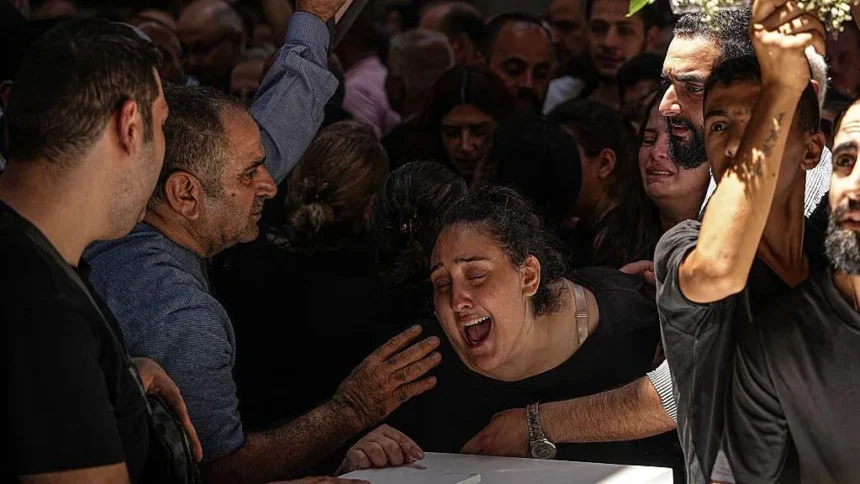Introduction
The Syria church attack in June 2025 has left deep scars on the country’s already-vulnerable Christian minority. A suicide bomber detonated an explosive inside the Greek Orthodox Mar Elias Church in Damascus, killing 25 and injuring over 60. This marks the first attack on Christians since the fall of Bashar al-Assad and is stirring renewed fear about the safety of religious minorities under Syria’s new leadership.
The Tragic Day: What Happened
On 22 June 2025, a gunman entered the Mar Elias Church during a Sunday evening service in the Dweila suburb of Damascus. After opening fire on worshippers, he detonated an explosive vest, killing himself and dozens around him. Among the dead was Milad, a school cleaner who died trying to push the attacker out of the Syria church attack.
Another 60 people were injured, including 23-year-old university student Angie Awabde, who suffered shrapnel wounds and a broken leg. Speaking from her hospital bed, she said, “I never expected this inside a church. We are not safe here anymore.”
Fear Among Syria’s Christians
This incident has reignited fear among Syria’s Christian communities. Before the war, Christians made up around 10% of Syria’s population, but that number has dropped significantly. Many have fled due to persecution by jihadist groups and war-related displacement Syria church attack.
The new Islamist-led government under interim President Ahmed al-Sharaa has pledged to protect all citizens, but Christians are skeptical Syria church attack. “We don’t feel protected anymore,” said a mourner at the funeral of the victims.
Who Was Behind the Attack?
The Syrian government has blamed the Islamic State (IS), although a lesser-known group, Saraya Ansar al-Sunnah, claimed responsibility. Officials say the group is likely affiliated with IS. The day after the attack, security forces killed two suspects and arrested six others in a raid on an IS cell.
Religious Leaders Speak Out
Greek Orthodox Patriarch John Yazigi strongly criticized the government’s response, saying, “A phone call from the president is not enough.” He added that the government must be held fully responsible for the lack of protection.
Archimandrite Meletius Shattahi, director of the Greek Orthodox Patriarchate’s charitable arm, echoed this, pointing to online videos showing armed preachers promoting religious extremism in Christian areas without government action.
Rising Tensions Post-Assad
Syria is now experiencing growing sectarian tensions. In recent months, there have been deadly attacks on Druze and Alawite communities. The new leadership, while promising reforms, has also imposed social restrictions, such as banning alcohol and enforcing strict dress codes—especially targeting non-Muslims.
As Christian minorities across the Middle East face increasing pressure, Syria’s own Christian population fears further marginalization under the new Islamist regime.
International Response
World leaders and religious organizations have condemned the bombing. The UN Security Council issued a statement demanding stronger protections for religious sites. Pope Leo XIV also urged the international community to pressure Syria into safeguarding its Christian heritage.
Despite these calls, survivors like Angie remain unconvinced. “If they can’t protect us, we want to leave,” she said.
Conclusion: What Needs to Change
The Syria church attack serves as a grim reminder that peace does not guarantee safety. To ensure a future for religious minorities:
- The government must increase security at religious sites.
- Extremist propaganda must be prosecuted swiftly and transparently.
- Global support is crucial to rebuild trust and infrastructure for religious coexistence.
Syria stands at a crossroads. Without immediate and decisive action, it risks losing centuries of religious diversity and cultural richness.
Explore Related:
– Terrorism in post-war Syria
– UN response to Syria violence
External References:
– AP News: Syria Church Bombing
– Reuters: Christian Community Reacts
– UN Press Release


